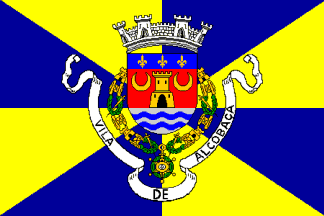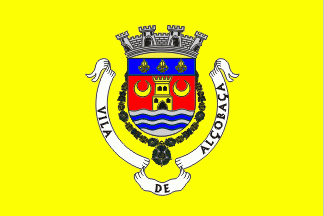
Last modified: 2015-10-25 by klaus-michael schneider
Keywords: alcobaca | chief(blue) | tower(golden) | fleur-de-lis (3;golden) | crescent | wave |
Links: FOTW homepage |
search |
disclaimer and copyright |
write us |
mirrors
![[Alcobaça municipality]](../images/p/pt-acb.gif) 2:3 image by Sérgio Horta, 8 Apr 1998
2:3 image by Sérgio Horta, 8 Apr 1998
It is a fairly typical Portuguese municipal flag, with the coat of arms centred on a gyronny field of yellow over dark blue (city rank).
António Martins-Tuválkin, 8 Apr 1998
![[Alcobaça municipality CoA]](../images/p/pt-acb).gif) image by Sérgio Horta,
image by Sérgio Horta,
The flag is a with the coat of arms in the centre. The arms consist of a shield, above wich there is a 5-towered mural crown, and surrounded in the lower part by the neckless of the Order of Tower and Sword (a portuguese decoration that may be attributed to our municipalities), and a scroll. André Serranho was able to find in one source we both have a tiny coat of arms with scroll, where it is visible that the scroll now bears one single word, "ALCOBAÇA", though it’s shape is identical as before. This means that the word is squeezed into the area where used to be the word "DE ".
The shield is horizontally divided in three fields: the upper field contains three fleurs-de-lis, the central field conteins a tower and two crescents facing upwards, all in gold, and the lower field contains two blue wavy lines on a silver field.
Jorge Candeias, 5 Apr 1998, 16 Apr 1998 and 29 May 1998, and António Martins-Tuválkin, 8 Apr 1998
Meaning:
Guessing the meaning of the charges (because the charges in Portuguese municipal coats of arms are not explained anywhere), I’d say that the fleurs-de-lis come from the time of the peninsular wars, the crescents come from battles against the moors in the old days of Portuguese expansion to the south, the tower comes from battles against the Spaniards, since there was a big victory of the Portuguese army in the territory of the municipality in a place called Aljubarrota, and the wavy lines symbolize two small rivers, Alcoa and Baça, on whose intersection Alcobaça is placed. That is even the origin of it’s name!
Jorge Candeias, 5 Apr 1998 and 16 Apr 1998
The name comes from "Alcoa" + "Baça", two rivers that join in that place. That’s why there’s two wavy fesses azure in the coat of arms.
António Martins-Tuválkin, 13 July 1999
Flag and arms published in the official journal Diário da República: III Série on 13 May 1997
António Martins-Tuválkin, 13 July 1999
![[Alcobaça municipality plain]](../images/p/pt-acb0.gif) 2:3 image by António Martins-Tuválkin, Apr 2010
2:3 image by António Martins-Tuválkin, Apr 2010
Plain (monocoloured) Portuguese subnational flags are not allowed to have variations without arms: plain flags always carry the coat of arms.
Jorge Candeias, 18 July 1999
Alcobaça is a city that is placed in the centre of Portugal, not far from the shore. It belongs to the district of Leiria, and is located to the southwest of the district’s capital. If the regions go forward, it will belong to the region Ribatejo e Oeste. The municipality has 417 km² of area, 13 communesand about 55 000 inhabitants.
Jorge Candeias, 5 Apr 1998 and 16 Apr 1998
 image by Jorge Candeias, 9 July 1999
image by Jorge Candeias, 9 July 1999
The flag of Alcobaça was an extraordinary one. While Alcobaça was still a town the flag was unusual in being a gyronny, because by the regulations of Portuguese municipal flags, gyronny flags are attributed to municipalities headed by cities. The shield was crowned by a 4-towered mural crown, as it should be given the town status of the place. The scroll contained the words "VILA DE ALCOBAÇA".
Jorge Candeias, 5 Apr 1998
 image by Sérgio Horta, 12 Aug 2015
According to Sérgio Horta the former flag was plain yellow with a coat of arms as previously described by Jorge Candeias, this version was published in the official journal Diário do Governo I Série on 9 May 1936.
image by Sérgio Horta, 12 Aug 2015
According to Sérgio Horta the former flag was plain yellow with a coat of arms as previously described by Jorge Candeias, this version was published in the official journal Diário do Governo I Série on 9 May 1936.
back to Municipalities of Portugal click here